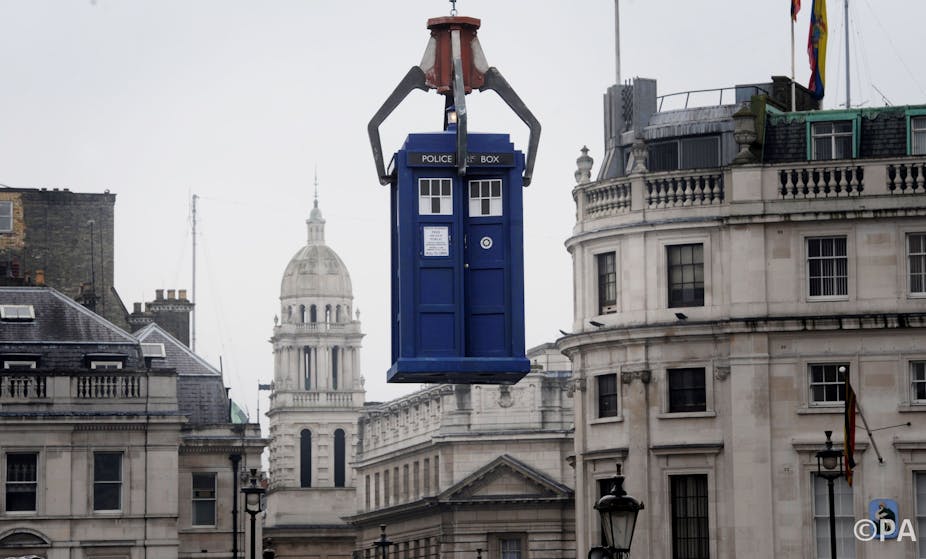As television series Doctor Who reaches its 50-year anniversary it has attracted criticism for being outdated. Is Doctor Who “thunderously racist”? Should the new Doctor be a woman? Do we have unreasonable expectations of what is, after all, just a television show?
Much of the recent public debate has focused on casting. Since it was announced that Matt Smith, who currently plays the Doctor, will be stepping down there have, predictably, been articles speculating about who will take over. Yet articles have also called for change, or debated whether the new Doctor should be someone other than a white male, in keeping with a more diverse 21st-century British population. Casting is a visible sign of the perceived inequalities of a long-running programme. Fewer articles have focused on female writers and directors on Doctor Who. There are hardly any, as a blog in The Guardian by Mathilda Gregory pointed out earlier this year.
The dominance of white men in both casting and crew of a major television series may not come as any surprise to those familiar with the British television industry, and especially with a science fiction and fantasy production. But why is the nation suddenly concerned about this? None of the news articles about Doctor Who have really addressed why the series should carry responsibility for inclusive representation. It’s been taken as a given that the stories we tell are indicators of our society.
Why is the Doctor different?
Other Saturday evening family dramas don’t attract this kind of heated debate. Similar series on BBC One, such as Robin Hood (2006-2009) and Merlin (2008-2012), also seem to be stuck with premises they cannot change, with central male protagonists and few female characters. Both Merlin and Robin Hood tried to update their stories, giving prominent roles to the few women featured, or operating with colour blind casting. But these series never attracted the flak Doctor Who has taken recently.

Doctor Who is different simply because it’s been around so long. It’s one of the longest running science fiction television series. It’s become a British institution, recognisable around the world. And it’s a BBC flagship programme. The public service remit of the BBC, combined with the classic status of the series suggest that perhaps Doctor Who does have a duty to inform and educate as well as to entertain, and to offer a more up to date reflection of today’s Britain.
It seems ironic to say that Doctor Who, a series about a time traveller, is stuck in the past. Yet like that other famous British franchise, the James Bond film series, Doctor Who introduced a particularly British protagonist to the world in the 1960s. Bond has also, of necessity, been reinvented over the decades and a series of actors have played 007. But like the Doctor, Bond remains white and male. The Bond movies have generally taken the route of gentle, but affectionate, parody. For several instalments now, Bond has been referred to within the films as a dinosaur, an outmoded part of British society. He’s a womanising action hero secret agent in a world that no longer, seemingly, requires this kind of heroism.
Time Lords should push the boundaries
And this is where Doctor Who differs. Science fiction, like other fantasy genres, often tells us about ourselves and our world by giving us stories apparently about something or somewhere else. Science fiction speculates, it asks, “what if…?” Doctor Who should push the boundaries of representation in the casting of its title character because it can. It’s a major science fiction series with a protagonist who is an alien. The Doctor need not be bound by social conventions.

Britain is famous for its creative industries and British television has a reputation for quality. Doctor Who is part of that success. In an era when even costume drama is becoming more contemporary in its focus and concerns, franchises like Doctor Who should look to the future, as well as back to their roots.
Imagine Idris Elba or Helen Mirren – who yesterday said it was time for a female Timelord to be considered – as the Doctor. Some of the popular opinion offered recently implies that audiences would feel such casting a betrayal of this familiar and much-loved character. Yet, the stories we tell have much to say about who we are and what we believe in.

In “The Rings of Akhaten” earlier this year the Doctor made a speech about being a time traveller: “I’ve seen things you wouldn’t believe.” In 50 years of Doctor Who we’ve seen daleks invade earth, we’ve seen dinosaurs on a spaceship, we’ve seen UFOs above Big Ben. Surely we’re ready to believe in a Doctor who isn’t white and isn’t male.

